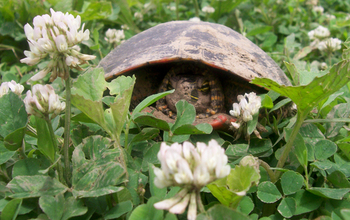Multimedia Gallery
A female adult painted turtle
A female adult painted turtle. Researchers are investigating how climate change may affect painted turtles.
More about this image
Nicole Valenzuela, a professor of ecology, evolution and organismal biology at Iowa State University (ISU), is sounding the alarm for the painted turtle, one of many reptiles for which climate change could prove particularly threatening.
A recently published study that was led by Valenzuela shows that fluctuations in temperature, driven by climate change, could devastate a range of species for which sex is determined by temperature during critical stages of development. Rising temperatures, along with wider oscillations in temperature, could disrupt the ratio of males to females in painted turtle populations and threaten the survival of the species, said Valenzuela.
Painted turtles undergo temperature-dependent sex determination while developing inside the egg. Eggs exposed to warmer temperatures tend to produce females, while cooler temperatures tend to produce males, said Valenzuela. Numerous turtle species -- as well as crocodilians, some lizards and the tuatara -- undergo temperature-dependent sex determination. Increasing average temperatures combined with stronger thermal fluctuations that result from climate change could lead to drastic shifts in the demographics of those species, she said, eventually leading to population collapse and possibly extinction.
Valenzuela’s previous studies exposed turtle eggs to constant temperatures in a laboratory to gauge the impact on sex determination, finding that an increase of about 4 degrees Celsius can mean the difference between a nest that produces only males and a nest that produces only females. But those experiments failed to account for the fluctuations nests encounter in the wild. Follow up studies with the simplest possible fluctuations (cycles of 12 hours 5 degrees Celsius above and 12 hours of 5 degrees Celsius below those constant values) caused sex reversal, or the process of some eggs producing males despite warmer average temperatures. Valenzuela hoped that if similar fluctuations caused sex reversal in natural nests, it could counter the effect of warmer temperature averages, alleviating the effects of climate change.
"If what we found is generalizable to other species with temperature-dependent sex determination, this is bad news," she said. "If an average increase in temperature is accompanied by greater variance, we’ll see populations becoming unisexual faster than anticipated. The greater oscillations add to the effect of just higher average temperature." Valenzuela said loss of habitat and exploitation has already left many turtles vulnerable to extinction, and climate change only adds to the peril these species face.
This research was support in part by the National Science Foundation (grants IOS 07-43284, MCB 08-15354, MCB 12-44355 and IOS 15-55999).
Learn more about this research in the ISU news story Climate change could devastate painted turtles, according to new study. The research is also mentioned in the NSF series, "4 Awesome Discoveries You Probably Didn’t Hear About This Week," Episode 26. (Date image taken: 2008; date originally posted to NSF Multimedia Gallery: May 16, 2019)
Credit: Photos taken by Nicole Valenzuela, Robert Literman and members of the Iowa Turtle Army program at the Valenzuela Laboratory of Evolutionary and Ecological Genomics at Iowa State University
Images and other media in the National Science Foundation Multimedia Gallery are available for use in print and electronic material by NSF employees, members of the media, university staff, teachers and the general public. All media in the gallery are intended for personal, educational and nonprofit/non-commercial use only.
Images credited to the National Science Foundation, a federal agency, are in the public domain. The images were created by employees of the United States Government as part of their official duties or prepared by contractors as "works for hire" for NSF. You may freely use NSF-credited images and, at your discretion, credit NSF with a "Courtesy: National Science Foundation" notation.
Additional information about general usage can be found in Conditions.
Also Available:
Download the high-resolution JPG version of the image. (3.2 MB)
Use your mouse to right-click (Mac users may need to Ctrl-click) the link above and choose the option that will save the file or target to your computer.



 All images in this series
All images in this series